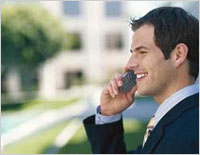Your cell phone can give you cancer
Mobile
23 Nov 2013 (Health Me Up): Mobile is an inseparable part of our life. We are completely dependent on our mobile phones and everyone has it, even school children.
 We are pretty sure that most of us are Nomophobiacs at least till some extent. You may have read reports that this tiny, super functional gadget can be life threatening, but is it the truth? There are reports that radiation can even turn your brain into an omelette. We did a little research and got you some factual answers.
We are pretty sure that most of us are Nomophobiacs at least till some extent. You may have read reports that this tiny, super functional gadget can be life threatening, but is it the truth? There are reports that radiation can even turn your brain into an omelette. We did a little research and got you some factual answers.
Radiation from your mobile?
Yes! Radiation is present from mobile phone in the form of electromagnetic waves. Through a particular radio frequency on these electromagnetic waves, you are able to make and receive calls. The radiation emission is present in small amounts from your mobile as these emissions are of short range waves.
Radiation absorption
Small amount of radio waves emitted from your mobile is absorbed by the body. According to Wikipedia - the maximum power output from a mobile phone is regulated by the mobile phone standard. In most systems the mobile and the base station check reception quality, signal strength and the power level. It is increased or decreased automatically within a certain span to accommodate different situations - when you are inside or outside the building or vehicle.
The rate at which energy is absorbed by the human body is measured by the Specific Absorption Rate (SAR). SAR data for specific mobile phones, along with other useful information, can be found directly on manufacturers’ websites.
Effects by mobile radiation
The effects can be of two types - thermal and non-thermal.
Thermal effects
One of the most common effects by electromagnetic waves is dielectric heating. When a person uses a cell phone, most of the heating effect will occur at the surface of the head.
This heating can increase your head temperature by a fraction of a degree. However this heat is less than the heat obtained by sunlight. The blood circulation isn’t affected much, as the brain’s blood circulation is capable enough to deal with excess heat, but the cornea of the eyes is not accustomed to a lot of heat.
Non-thermal effects
The communications procedure used by mobile phones often result in low-frequency pulse from the carrier signal.
"Non-thermal effects" could be reinterpreted as a normal cellular response to an increase in temperature. This heat can activate several messenger system, gene expression and production of heat shock protein in order to defend the cell against stress caused by heat.
According to a study conducted by The Journal of the American Medical Association - exposure to radio frequency signal waves within parts of the brain closest to the cell phone antenna resulted in increased levels of glucose metabolism.
In non-thermal effects, following problems can be seen.
- Blood-brain barrier effects
- Cancer
- Cognitive effects
- Electromagnetic hypersensitivity like tingling sensation in the skin of the head, headache, dizziness, loss of mental attention etc.
- Sleep disorders
- Behavioural effects
Reduce the effect of phone radiation
In order to lower the effects of mobile phone radiation follow these simple steps:
Keep some distance
Behind every phone packaging, in fine prints most of the mobile brands recommend to keep your cell at least 10millimeters away from your body. Learn to maintain some distance with your tiny buddy. It may sound difficult but it is not impossible.
Weak signal is bad
Cell phones release more radio frequency radiation when the signal is low. That means, if your signal is low avoid using your cell phone to prevent unnecessary harm.
Choose hands-free headsets
Always choose hands-free headsets, as it will help to reduce the radiation emissions to the brain.
Switch sides
Change hands (and ears) frequently while talking on your cell phone to limit the amount of exposure to one side of your head.
Use speakers to dial numbers
The radiofrequency radiation is strongest when your phone is attempting to place a call, so hold it away from your head until you hear someone pick up.



















